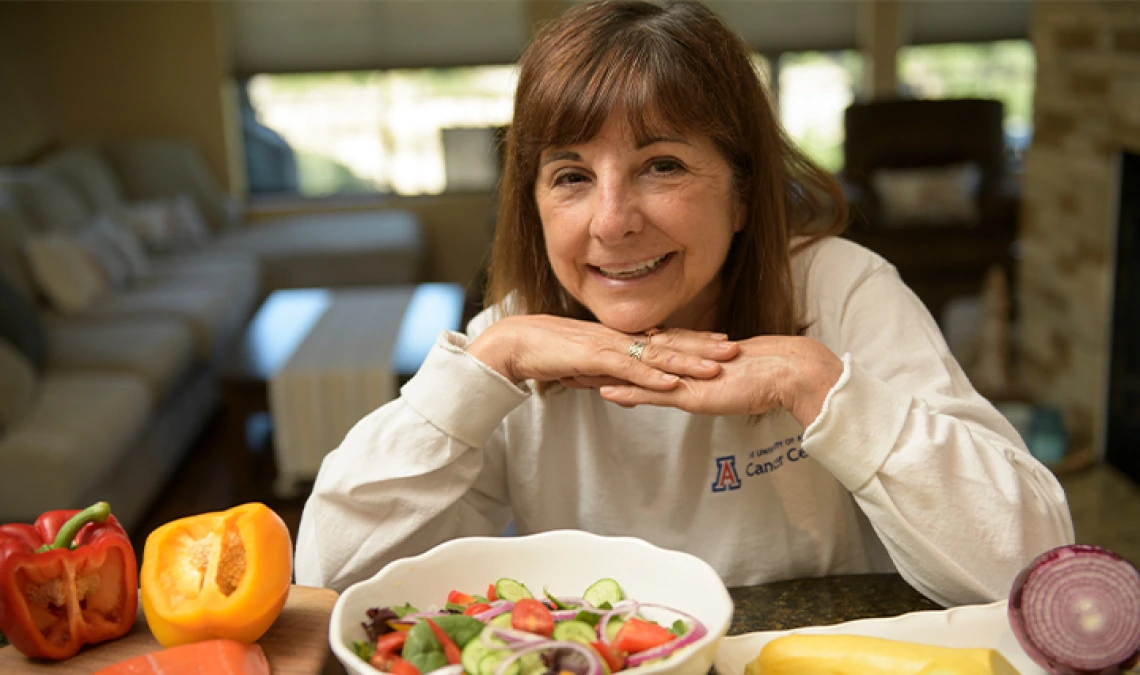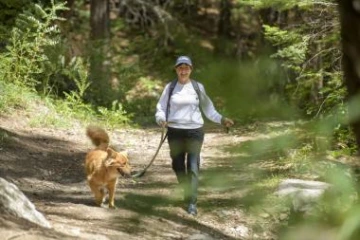Lifestyle Changes Can Be Biggest Step in Cancer Prevention
Health Sciences cancer prevention expert Cynthia Thomson, PhD, shares updated guidance that could save lives, including new advice on food and alcohol.

Cancer prevention can be as easy, or difficult, as adopting three new lifestyle guidelines from the American Cancer Society: be active, select foods to make a healthy eating pattern and don’t consume alcohol.
The new guidelines unveiled this year by the American Cancer Society (ACS) were developed by a team of experts led by University of Arizona Health Sciences’ Cynthia Thomson, PhD.
Dr. Thomson was the co-lead of the ACS committee assembled to revisit the cancer prevention guidance this year. Together, they detailed simple yet meaningful ways in which diet and physical activity can help people reduce their personal risks for developing cancer.
The committee included experts from institutions and public health organizations from around the country. Dr. Thomson, the University of Arizona Cancer Center’s interim associate director for Population Science and co-leader for its Cancer Prevention and Control Program, also contributed to the ACS recommendations in 2007.
“These ACS guidelines really started as an outreach to patients and family members,” said Dr. Thomson. “But they also bring together leaders in the fields of diet, physical activity and cancer to form a consensus on how best to develop the guidelines and to determine what is most important to convey to the public.”
Dr. Thomson is a professor in the Mel and Enid Zuckerman College of Public Health, the director of the Canyon Ranch Center for Prevention and Health Promotion and a member of the BIO5 Institute.

Kris Hanning, UAHS BioCommunicationsCynthia Thomson, PhD, walks her dog. Exercise recommendations are more specific in the latest update to the American Cancer Society’s prevention guidelines.
The goal of the Diet and Physical Activity Guideline for Cancer Prevention is to provide the most current scientific evidence related to dietary and activity patterns in relation to cancer risk. Research has historically and overwhelmingly shown that, for Americans who do not use tobacco, the most significant determinants of cancer risk are weight control, dietary choices and levels of physical activity.
“We have really narrowed our focus to the importance of maintaining healthy body weight, practicing healthy dietary patterns and being physically active,” Dr. Thomson said. “The research data are consistently telling us that we can combine these health-promoting factors to have the greatest reduction in risk for cancer, including numerous cancer types.”
Being more active, eating healthier, eliminating alcohol consumption
In developing the 2020 guidelines, Dr. Thomson and the committee followed the latest science to reaffirm what was already apparent from the previous recommendations eight years earlier: a healthy body weight is critical to cancer prevention.
The ACS says seven in 10 Americans are currently obese or overweight, and only about half of people are aware of the link between cancer and obesity.
“Weight control has become the primary guideline that we want people to realize,” said Dr.

A healthy eating pattern includes foods that are high in nutrients in amounts that help achieve and maintain a healthy body weight.
Thomson. “Having a healthy body weight throughout adult life is a significant prevention factor for many cancers.”
To maintain a healthy body weight, physical activity and diet are increasingly important. In response, the committee amplified its messaging for several of the key recommendations published in 2012.
The previous advice to “adopt a physically active lifestyle” is now even more direct: “Be physically active.” Adults should engage in 150-300 minutes of moderate-intensity physical activity per week, or 75-150 minutes of vigorous-intensity physical activity, or an equivalent combination; achieving or exceeding the upper limit of 300 minutes is optimal. Reducing sitting and screen time is also advised.
The committee tweaked its advice on diet. Instead of “consume a healthy diet, with an emphasis on plant foods,” people are now encouraged to “follow a healthy eating pattern at all ages.” A healthy eating pattern includes foods that are high in nutrients in amounts that help achieve and maintain a healthy body weight. It does not include sugar-sweetened beverages or red and processed meats.
An even more emphatic change in the guidelines comes with alcohol consumption. While it was previously recommended that people who chose to drink alcohol “limit” their consumption, the latest advisement is that “it is best not to drink.”
“Based on what we have learned, we think people should not be drinking alcohol if they want to prevent cancer,” said Dr. Thomson. “Of course, people may choose to do so, but we need to make it clear that when you drink, you are increasing your risk of many cancers.”
Spreading the word

Cynthia Thomson, PhD, is the University of Arizona Cancer Center’s Interim Associate Director for Population Science and co-leader for its Cancer Prevention and Control Program.
The ACS has its own resources to spread awareness for the new cancer prevention diet and physical activity guidelines, but Dr. Thomson is compelled to share her knowledge and expertise locally. On September 16, she presented at Wellness Wednesdays, a weekly 30-minute interactive webinar featuring experts including UArizona Health Sciences faculty, staff and students.
“As someone who has dedicated my career to cancer prevention, I saw Wellness Wednesdays as an opportunity to further that effort and explain these guidelines on a more local scale,” said Dr. Thomson.
Her presentation, ‘“Preventing Cancer with Diet and Physical Activity: Can I get through Life Cancer-free?” detailed the guidelines and outlined the process for developing them. She also explained how individuals can assess their own health behaviors by monitoring physical activity and body weight, setting lifestyle behavior goals, and being a healthy role model for others, especially family and friends.
“It is never too late to start eating better and being more physically active,” said Dr. Thomson. “Even small changes in diet and activity can have a big impact. Losing weight favorably modulates so many mechanisms that can be tumor-promoting and also enhances our immune response against cancer.”




